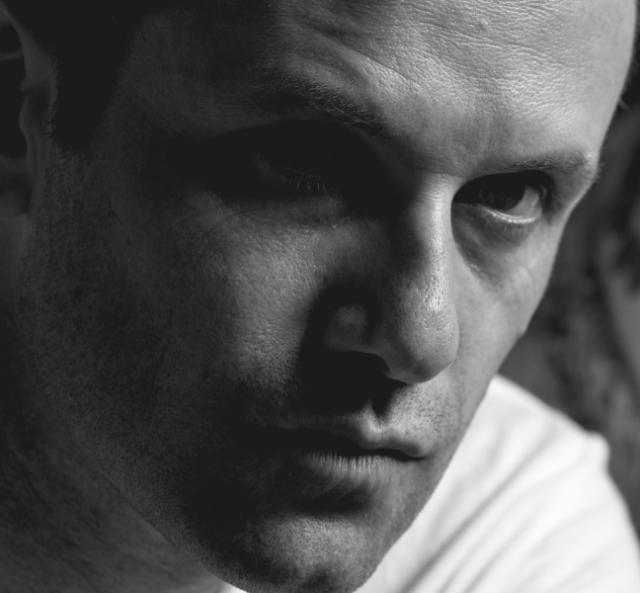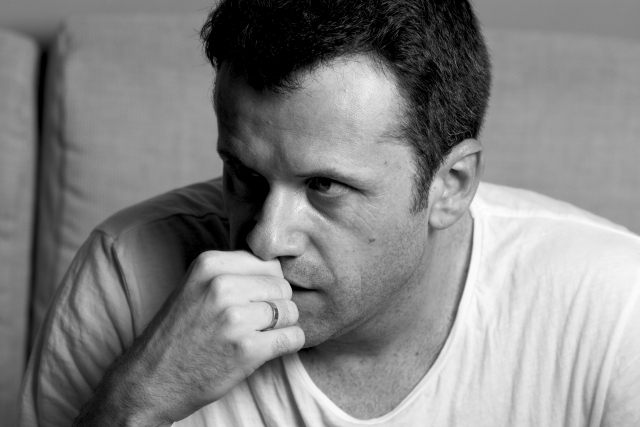Title photo: Vasil Garnizov
Anastasia Balezdrova
Theatre and film director Javor Gardev is one of the most distinguished Bulgarian authors. He is the author of numerous productions, including theatre performances, interdisciplinary projects such as video and art performances, radio plays and a film which was awarded the "Silver St. George" prize for staging at the 30th edition of the festival in Moscow. The director has won many national and international awards, including the Berliner Grand Prix Europe for Best European Radio Drama for "The Atoll" in 1999.
 Javor Gardev supports and participates in the protests that followed the appointment of Delian Peevski as the head of the State Agency for National Security and have been going on for 29 days already. He analyzes the events and presents his view on them in an interview for GRReporter.
Javor Gardev supports and participates in the protests that followed the appointment of Delian Peevski as the head of the State Agency for National Security and have been going on for 29 days already. He analyzes the events and presents his view on them in an interview for GRReporter.
How would you comment on the fact that the recent situation in Bulgaria has become the subject of discussion in the European Parliament?
The European Union is, to some extent, a united body already, although it is not yet homogeneous and is still forming. Therefore, when there is a problem in any part of the body, it is normal for the head to show interest in it. It is completely logical for such a debate to be triggered when there is unrest. The question is how this debate in the European Parliament may make clear to the Members of the European Parliament the situation in Bulgaria. Bulgaria has many internal political characteristics that are absolutely impervious to an outsider and which are based more on domestic relations and interests within the country itself rather than on any political principles. That is why it is difficult to explain the development to these people and it is difficult for them to understand the events.
The European Green Party has differentiated itself from the Party of European Socialists which it usually supports. What do you think has caused this?
This is not a surprise to me. Each party reacts in its own way to specific political issues. This is the normal democratic practice and it is not necessary to expect that the Green Party will support the Socialists in each case. It is obvious that it agrees with some policies but we cannot expect this regarding others. In this sense, I suppose that it has sided with the Green Party of Bulgaria. It is not represented in the Bulgarian Parliament and the fact that it would form a coalition with the leftist government in Bulgaria is not self-evident. The Green Party of Bulgaria is a special case. Of course, it is a left-wing party and it is facing the question of whether it will enter the Reformist Bloc and how. I think that there is an internal debate in the party. I am not following it but it is logical to think that, as a progressive party and a party of activists with a specific cause, this will be a party with a proper position. I do not know whether it will reach a stable agreement with the right-wing parties in the Reformist Bloc but I hope that this will happen. The aim is publicly important and worthwhile.
You state in a recent interview that you voted for the Green Party of Bulgaria. How did it attract you?
What attracted me to support it in the last elections, although I had not traditionally voted for it so far, was that I read its programme and found there quite reasonable things, especially in the area of tax policy. It offers a very reasonable taxation which is allocated in accordance with income and is a stimulating factor for both the middle class and poorer. It offers fair taxation of the rich and no taxation to a certain minimum for the poor. It seems a reasonable tax policy for Bulgaria. Of course, I support the main cause of the Green Party of Bulgaria which seems to be outside the scope of the right and left wings. Naturally, some of its causes are associated with left policies but they are reasonable and progressive.
Do you think that the formation of this reformist block will succeed?
The situation is very complex because a new urban political subject is actually being established. It represents a specific urban class that seeks to differentiate its political representation and to have a considerable influence in Bulgarian politics. Whoever fails to articulate the demands and political intuitions of this new subject most precisely would be an important factor in the next parliament.
Yes, I do. I even think that it should have been set up a lot faster. I also think that, in a sense, the Bulgarian politicians have been unable to respond to the political moment and this affects all areas of the political spectrum. They have been unable to realize what is happening. Only the Reformist Bloc is trying to mature in order for its identity to respond to the processes. Its attempt to emerge is something similar. I am really interested to see what will happen in this area. In the other areas, I see replication of decayed and outdated comments on what is happening in the country and interpretations by using obsolete terminology. No explanatory findings are being offered to satisfy the requirements of the moment. The situation is very complex because a new urban political subject is actually being established. It represents a specific urban strata that seeks to differentiate its political representation and to have a considerable influence in Bulgarian politics. Whoever fails to articulate the demands and political intuitions of this new subject most precisely would be an important factor in the next parliament.
What is the alternative to the government in Bulgaria in the event of early elections?
I do not have an accurate forecast as to what would happen in the case of early elections. The voters will decide this. The point is that a very important class for society which is not represented in parliament has rebelled and I think it will try to send its representatives into the cabinet. The Citizen for European Development of Bulgaria (GERB) party seems to be unrepresentative of this class, which is an economically active and important part of Bulgarian society.
How do you see the future of the protests and how long do you think this cabinet will survive?
I cannot make any predictions. Currently, there is the phenomenon of the growing stubbornness which is a very important factor at this point. Stubbornness is becoming a major component of the political action amidst feigned deafness as well as endurance.
Do you think the protests have already nominated some informal leaders?
The protest does not allow anyone to head it and use it. Apparently, it is aware of itself as a collective political body led by the intuition of direct democracy. This is interesting. However, direct democracy in its pure form is not possible here. Its remnants can be seen in the Swiss cantons today, for example, but we need a time machine to take us back to Ancient Greece in order for us to return to it in its purity.
What I have noticed is that the protest itself is actively blocking this option. Certain segments of the protesters simply do not recognize any leaders and faces of the protest. The protest does not allow anyone to head it and use it. Apparently, it is aware of itself as a collective political body led by the intuition of direct democracy. This is interesting. However, direct democracy in its pure form is not possible here. Its remnants can be seen in the Swiss cantons today, for example, but we need a time machine to take us back to Ancient Greece in order for us to return to it in its purity. Such a polity requires, first of all, demos, i.e. a class of free citizens but there is no way for the mass of the labour force to be in its ranks.
How would you comment on the role of the media in this process?
The media behave as expected. Their line depends on their ownership. That is why the interpretation of the events varies.
Do you see a trend towards greater objectivity in comparison with the period before the elections?
No, I rather see more radical extremes in interpretation. There are media that are turning a blind eye and media that are opening their eyes. Some are turning a too blind eye whereas others are opening their eyes very wide. Some are turning a deaf ear too and others are making extreme interpretations... As I have already mentioned, this depends on the ownership of these media and on the degree of self-censorship. The national broadcaster behaves with dignity.
Do you think that the President's decision to support the protests could give them a strong incentive to alter the status quo?
I have no idea. I cannot decide whether this is so or not.
Do you think that the intention of union leader Konstantin Trenchev to announce a national strike is late in coming or that maybe it will not lead to any significant results?
Frankly speaking, I cannot predict the consequences of such a thing, especially during these summer months. I have no idea how it could affect the political process. Of course, if this happens in the autumn, things will be quite different as politically important seasons in Bulgaria, as there are such, do not exactly coincide with the summer. The time of serious political challenges in Bulgaria comes in the autumn and ends in spring.

Photos of Javor Gardev by Kalin Nikolov
If you were to compare the developments in Bulgaria with a literary or theatrical work, what would it be, which genre?
Grotesque, farce and domestic drama are invariably inherent genres in our politics which could evolve to low quality melodrama in the best case scenario. Tragedy and comedy require courage of the objectives and scope of the spirit which are absent at present.